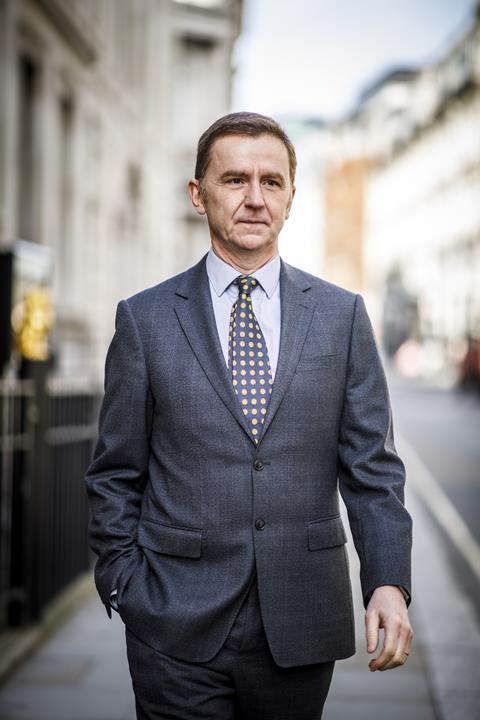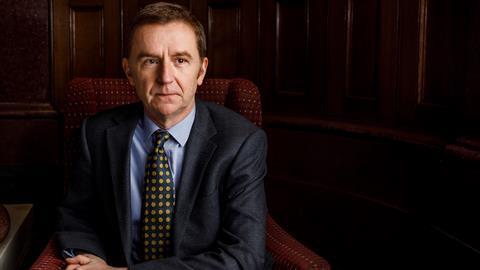Law Society chief executive Ian Jeffery talks to Paul Rogerson about leadership, law and serving the profession
BIOG
BORN
Billericay, Essex
EDUCATION
LLB, University College London
Nottingham Law School (now at Nottingham Trent University)
MBA, London Business School
ROLES
Articles, Lewis Silkin, 1990; qualified, 1992. Specialist in IT and IP law. Partner, 1998; managing partner, 2005; chief executive and managing partner, April 2016-September 2019; partner and venture lead, October 2019-March 2021
Chief executive, Law Society of England and Wales, September 2022-
It is axiomatic that successful lawyers do not always become successful leaders. ‘There are significant differences between lawyers and other business professionals in their attitude to ambiguity and risk,’ noted a LexisNexis article on the subject. ‘Lawyers are more likely to try to avoid problems or situations that involve high levels of uncertainty, or that are perceived to be difficult or threatening. While this type of behaviour may be highly adaptive when performing the role of lawyer, as it can help clients avoid making mistakes and getting involved in costly litigation, it is likely to undermine leadership capability.’
Ian Jeffery’s career is notable not only because he confounded this stereotype, but also because he did so at such a young age. Jeffery became managing partner of top-100 commercial firm Lewis Silkin at just 37.
There are Premier League footballers older than that. Unlike most of them, however, Jeffery is very much a ‘one-club’ man. He spent 30 years at Lewis Silkin – taking over as captain in the ‘second-half’, to labour my sporting metaphor.
The first half of his career was spent ascending to become practice group head in intellectual property litigation. Jeffery also led the formation of Lewis Silkin’s media, brands and technology department.
So when exactly did Jeffery decide he wanted to become a leader, as well as a co-owner?
‘It became an ambition relatively early,’ he says. ‘I just became very interested in the business and people management aspects of a legal practice. Certainly, from the point that I became a partner and probably before that, I would tend to get drawn into and want to be involved in firm projects around these issues. So increasingly I got known for that and was drawn into them even more.’
So did Jeffery enjoy learning to be a politician as well as a practitioner?
‘I think, first of all, you just have to be interested,’ he responds. ‘And yes, you do need to have good relationship skills. If you combine those interests with the ability to do your regular client-facing work, you can build good relationships across the firm and potentially new avenues open up for you.
‘Of course it’s not for everyone, by any means. The majority of very successful solicitors throughout the profession will go their whole career without a formal management role and still be extremely successful.’
Strategic objectives 2022-2025
To make the most powerful impact with our resources, [the Law Society] will focus on the priorities that matter most to our members as they address the professional and business challenges [they face].
To maintain that focus and alignment with our members’ priorities we have set four strategic objectives for the period 2022-2025. Those objectives are to:
- promote the value of the profession and provide a compelling member offer;
- protect the justice system and make sure it applies to everyone equally;
- maximise our potential by growing our commercial reach, by being efficient and sustainable;
- be an employer of choice for people who want to make a difference.
In delivering these objectives we will use research, insight, and data to inform all our services, activities, and digital offerings. Where evidence is not available or clear, we will look to work with members and other partners to fill those gaps.
We will also break down barriers to make the Law Society more diverse and inclusive. Both through our people, making sure that we are responding to staff needs in a way that is relevant and meaningful to them and their circumstance, and by advocating for greater equality, diversity, and inclusion across the legal profession.
We will build our achievements over three years. Our four objectives will remain the same over that period, but we will develop more detailed plans on how we will deliver them during each year, as we work to increase capacity and capability, making sure we operate as a learning organisation and one that builds on its successes from year to year.
What were the most important lessons he learned from running a major law firm?
‘One was to have a really clear focus for the kind of work the firm did. Because, particularly for mid-size and upper mid-size firms, if you go back a decade or two, many focused on the idea of being completely full-service and “all things to all people”. We did have a broad practice, but we didn’t make that our focus or selling point.
‘What we talked about were the things that we did particularly well. Over time, those areas got more and more traction, and relatively quickly became leading practices. And when you’ve got a leading practice in a particular area you attract better work – it’s a virtuous circle.’

Ian Jeffery took over from Trevor Watkins as managing partner at Lewis Silkin in 2005, a transition which coincided with media, brands and technology becoming a full department in its own right (its members having previously worked in either litigation or corporate). Jeffery also oversaw transition to LLP status in 2006 and an office move to new headquarters at 5 Chancery Lane, where the firm remains.
‘The other thing that’s really important and, to an extent, we did get right, was to have a real focus on the experience of people working at the firm. If you look back to the model of a big, general practice as it was in the early 2000s – law firms trying to be all things to all people – they didn’t really look very hard at that.
‘There’s the client side of the market, but there is also the talent side. If you end up performing poorly on both of those, it’s a sort of doom loop – the opposite of a virtuous circle. You can’t get the work, you can’t keep the people, your growth stalls and the firm can sink.’
Not coincidentally, in 2009 Lewis Silkin was first recognised as one of the best 100 companies to work for in The Sunday Times’ high-profile annual league table. Staff gave the firm its highest score in the ranking’s ‘fair deal’ category. Fourteen years ago, benefits already included free private healthcare, childcare vouchers, subsidised sports facilities, critical illness insurance, life assurance and discounted services. Employees also got individual performance-based bonuses as well as a firm-wide profit-related bonus.
By 2012, Lewis Silkin was dubbed an ‘extraordinary’ employer and came in at number 19 on The Sunday Times list – the highest-ranking law firm.
That feelgood factor doubtless contributed to Lewis Silkin’s impressive expansion. New office openings in Cardiff, Hong Kong and Dublin all came on Jeffery’s watch. In his last full year as managing partner and chief executive, the firm delivered profit before member remuneration and profit shares of £25m on turnover of £59m.
Unsurprisingly, Jeffery was re-elected to the top job by his fellow Lewis Silkin partners four times. Like them, he will have enjoyed the fruits of his own labours. After so many years at the top, many would have stepped away from the daily grind, but Jeffery returned from a brief period as a consultant to become chief executive of the Law Society. Why?
‘I hadn’t expected the role at the Law Society to come up and certainly hadn’t planned for it,’ he says. ‘But it does two things. First, it builds on all that I’ve done before, in terms of the contextual knowledge of the legal services industry and the pressures of running a firm – or a certain type of firm. And second, the wider skills of leadership and management involved in running an organisation with several hundred people and a turnover of £50m-plus.
‘But most importantly for me, it added a new layer or package of interest to all that had gone before. The political and influencing work that the Society does; its place within the international community; the breadth of different types of law firm and lawyers that the Society represents. These were all new and interesting things for me to get involved in.’
What the Law Society has learned
‘The past five years have impacted every part of the organisation and what we have learned informs our approach to delivery in this strategy.
Our ability to introduce new digital platforms has matured over the past three years and we will continue to embed an agile approach to our project teams.
We responded quickly to support members during the initial shock of the pandemic and lockdown and will continue to responsively convene the right members to inform the support and guidance we provide on emerging issues.
Just like every other organisation, we have adapted to remote and hybrid operations and will integrate this into our future approach for both staff and member engagement.

We have pursued a strategy over the past five years to keep the PC flat or reduce it and have driven down the cost base of the organisation but this is not a sustainable approach for the future.
We are ambitious to deliver more for our members and must recognise that ambition requires resource to succeed.
Given the scale of change over the past five years, it is also clear that we need to be confident that our governance processes and controls are robust and, importantly, are well understood by all parts of the organisation.
The Law Society staff and elected and appointed members will succeed through alignment to a single plan that focuses on delivery for members in an ever changing operating environment.
Finally, the Law Society has an incredibly powerful voice when it is mobilised and focuses on the biggest issues that members care most about. We have the ability to shape and influence our environment but this takes discipline and a commitment to prioritisation.’
Excerpt from Corporate Strategy 2022-2025
Running a law firm requires expertise in consensus-building and diplomacy, but also a willingness to take unpopular decisions. The same applies at the Law Society, where there are many centres of power – president, other office-holders, Council, board, chief executive, senior leadership team. And there can be turbulence, I note. The last permanent chief executive but one, Catherine Dixon, quit in 2017 over what she said was lack of progress made by the organisation’s 100-strong Council in streamlining governance.
‘You mention the difficulty and challenges of the job, and certainly some of those challenges are political,’ Jeffery acknowledges. ‘But they’re an extension of the kind of political skills one needs to develop as a managing partner in a practice, but amplified and extended across a broader community. Well, it is complex, and it takes some navigation. It takes time to build the relationships that you need to build to function effectively across that environment.’
Jeffery already had invaluable experience of navigating a professional body before taking the job. In 2017 he became a lay trustee of the Royal College of General Practitioners, which he says is not dissimilar in structure to the Law Society. Before that, he spent five years as a trustee of King’s College London Students Union.
'A key challenge is the sheer diversity and breadth of membership; looking after so many different types of lawyer and certainly different types of practice and business setting'
So what can Jeffery do to improve the Law Society’s services to solicitors?
He responds by alluding to Chancery Lane’s corporate strategy for 2022-2025 (see box, left), the thrust of which had been largely determined by the time he arrived. Reflecting on the previous five years, it seems clear that Chancery Lane’s wholesale embrace of digitisation was given real impetus by lockdown. Necessity, to some degree, became the mother of invention.
‘I think a key challenge is the sheer diversity and breadth of membership; looking after so many different types of lawyer and certainly different types of practice and business setting. Where do you actually focus? How do you drive things forward? For different parts of the membership, different things matter.
‘For the smaller firms with fewer resources, there’s more of a focus on practice notes and resources that help people in their daily practice, such as regarding the management of risk. At the other end of the scale, where firms are well resourced and have all those materials, there is more focus on our representation, lobbying and international work.’
'A properly resourced and functioning criminal justice system is a very important part, not just of the wider profession all solicitors join, but society as a whole'
Jeffery also highlights coming efforts to boost visibility among in-house lawyers, who now comprise almost one in four of all solicitors. Watch this space on that.
He adds: ‘But while the membership is of course very diverse, there are still unifying values and interests across the whole of the profession. The big and most obvious one is the collective regard to and importance of the rule of law and the proper functioning of the justice system. So, for example our work on criminal legal aid, lobbying government about the Bellamy review, is doubly important. A properly resourced and functioning criminal justice system is a very important part, not just of the wider profession all solicitors join, but society as a whole.’
He adds: ‘There is more to it than just the funding of a particular type of litigation activity; it’s about the infrastructure of the system, and the lack of judges and practitioners to move cases forward. We’ve got dilapidated court premises, we’ve got delays in cases progressing. We’ve got a
lack of capable people there to do the work. Even where that is focused on just one part of the system, the damage to the brand of justice in England and Wales can be much wider.’
Ian Jeffery, it is clear, will do what he can to burnish that brand.
Photography: Darren Filkins
































No comments yet